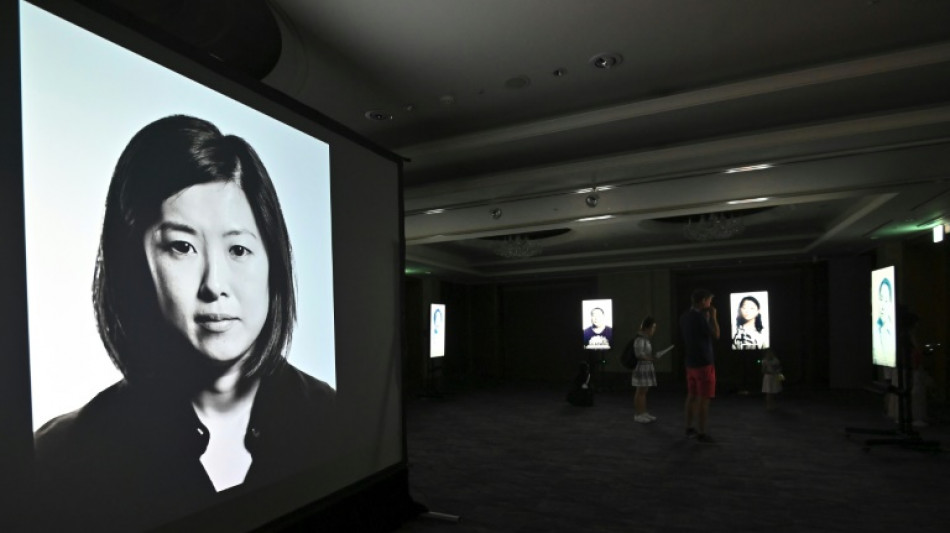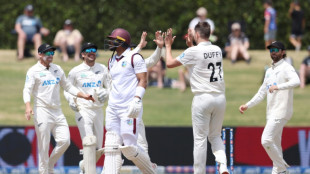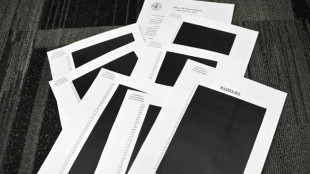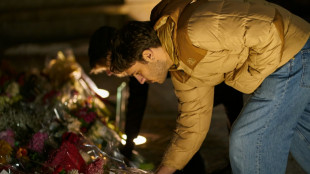
-
 England lose Duckett in chase of record 435 to keep Ashes alive
England lose Duckett in chase of record 435 to keep Ashes alive
-
Australia all out for 349, set England 435 to win 3rd Ashes Test

-
 US strikes over 70 IS targets in Syria after attack on troops
US strikes over 70 IS targets in Syria after attack on troops
-
Australian lifeguards fall silent for Bondi Beach victims

-
 Trump's name added to Kennedy Center facade, a day after change
Trump's name added to Kennedy Center facade, a day after change
-
West Indies 206-2, trail by 369, after Duffy's double strike

-
 US strikes Islamic State group in Syria after deadly attack on troops
US strikes Islamic State group in Syria after deadly attack on troops
-
Epstein files opened: famous faces, many blacked-out pages

-
 Ravens face 'special' Patriots clash as playoffs come into focus
Ravens face 'special' Patriots clash as playoffs come into focus
-
Newly released Epstein files: what we know

-
 Musk wins US court appeal of $56 bn Tesla pay package
Musk wins US court appeal of $56 bn Tesla pay package
-
US judge voids murder conviction in Jam Master Jay killing

-
 Trump doesn't rule out war with Venezuela
Trump doesn't rule out war with Venezuela
-
Haller, Aouar out of AFCON, Zambia coach drama

-
 Nasdaq rallies again while yen falls despite BOJ rate hike
Nasdaq rallies again while yen falls despite BOJ rate hike
-
Bologna win shoot-out with Inter to reach Italian Super Cup final

-
 Brandt and Beier send Dortmund second in Bundesliga
Brandt and Beier send Dortmund second in Bundesliga
-
Trump administration begins release of Epstein files

-
 UN Security Council votes to extend DR Congo mission by one year
UN Security Council votes to extend DR Congo mission by one year
-
Family of Angels pitcher, club settle case over 2019 death

-
 US university killer's mystery motive sought after suicide
US university killer's mystery motive sought after suicide
-
Rubio says won't force deal on Ukraine as Europeans join Miami talks

-
 Burkinabe teen behind viral French 'coup' video has no regrets
Burkinabe teen behind viral French 'coup' video has no regrets
-
Brazil court rejects new Bolsonaro appeal against coup conviction

-
 Three-time Grand Slam winner Wawrinka to retire in 2026
Three-time Grand Slam winner Wawrinka to retire in 2026
-
Man Utd can fight for Premier League title in next few years: Amorim

-
 Pandya blitz powers India to T20 series win over South Africa
Pandya blitz powers India to T20 series win over South Africa
-
Misinformation complicated Brown University shooting probe: police

-
 IMF approves $206 mn aid to Sri Lanka after Cyclone Ditwah
IMF approves $206 mn aid to Sri Lanka after Cyclone Ditwah
-
US halts green card lottery after MIT professor, Brown University killings

-
 Stocks advance as markets cheer weak inflation
Stocks advance as markets cheer weak inflation
-
Emery says rising expectations driving red-hot Villa

-
 Three killed in Taipei metro attacks, suspect dead
Three killed in Taipei metro attacks, suspect dead
-
Seven Colombian soldiers killed in guerrilla attack: army

-
 Amorim takes aim at Man Utd youth stars over 'entitlement'
Amorim takes aim at Man Utd youth stars over 'entitlement'
-
Mercosur meets in Brazil, EU eyes January 12 trade deal

-
 US Fed official says no urgency to cut rates, flags distorted data
US Fed official says no urgency to cut rates, flags distorted data
-
Rome to charge visitors for access to Trevi Fountain

-
 Spurs 'not a quick fix' for under-fire Frank
Spurs 'not a quick fix' for under-fire Frank
-
Poland president accuses Ukraine of not appreciating war support

-
 Stocks advance with focus on central banks, tech
Stocks advance with focus on central banks, tech
-
Amorim unfazed by 'Free Mainoo' T-shirt ahead of Villa clash

-
 PSG penalty hero Safonov ended Intercontinental win with broken hand
PSG penalty hero Safonov ended Intercontinental win with broken hand
-
French court rejects Shein suspension

-
 'It's so much fun,' says Vonn as she milks her comeback
'It's so much fun,' says Vonn as she milks her comeback
-
Moscow intent on pressing on in Ukraine: Putin

-
 UN declares famine over in Gaza, says 'situation remains critical'
UN declares famine over in Gaza, says 'situation remains critical'
-
Guardiola 'excited' by Man City future, not pondering exit

-
 Zabystran upsets Odermatt to claim first World Cup win in Val Gardena super-G
Zabystran upsets Odermatt to claim first World Cup win in Val Gardena super-G
-
Czechs name veteran coach Koubek for World Cup play-offs


S. Korea govt responsible for international adoption fraud: inquiry
A South Korean official enquiry said Wednesday the government was responsible for abuse in international adoptions of local children, including record fabrication and inadequate consent, and recommended an official state apology.
"It was determined that the state neglected its duty ... resulting in the violation of the human rights of adoptees protected by the constitution and international agreements during the process of sending a lot of children abroad," South Korea's Truth and Reconciliation Commission said in a statement.
The country -- now Asia's fourth biggest economy and a global culture powerhouse -- remains one of the biggest ever exporters of babies in the world, having sent more than 140,000 children overseas between 1955 and 1999.
International adoption began after the Korean War as a way to remove mixed-race children, born to local mothers and American GI fathers, from a country that emphasised ethnic homogeneity.
It became big business in the 1970s to 1980s, bringing international adoption agencies millions of dollars as the country overcame post-war poverty and faced rapid and aggressive economic development.
More recently, the main driver has been babies born to unmarried women, who still face ostracism in a patriarchal society, and according to academics, are often forced to give up their children.
In a landmark announcement, the country's truth commission concluded after a two-year and seven-month investigation that human rights violations occurred in international adoptions of South Korean children, including "fraudulent orphan registrations, identity tampering, and inadequate vetting of adoptive parents".
It also said "numerous cases were identified where proper legal consent procedures" for South Korean birth parents were "not followed".
The commission also said the South Korean government failed to regulate adoption fees, allowing agencies to set them through "internal agreements", effectively turning it into a profit-driven industry.
And despite regulations requiring verification of adoptive parents' eligibility, an overwhelming majority -- 99 percent -- of intercountry adoption approvals in 1984 alone were granted on the same day or the following day, the commission said, citing its investigation.
"These violations should never have occurred," the commission's chairperson Park Sun-young told reporters.
"This is a shameful part of our history," she added.
- 'Eternal uncertainty' -
For years, Korean adoptees have advocated for their rights, many reporting that their birth mothers were forced to give up their children, leading to the fabrication of records to make them legally adoptable.
Some South Korean birth parents and adoptees even claimed that their children were kidnapped -- by agents who sought out unattended children in poor neighbourhoods -- or that authorities directed lost children towards adoption without trying to reunite them with their families, in some cases intentionally changing the child's identity.
Some adoptees -- such as Adam Crapser -- were deported to South Korea as adults because their American parents never secured their US citizenship.
The commission confirmed human rights violations in only 56 out of 367 complaints, saying there was an overwhelming amount of data to try to verify, and said it would "make efforts" to review the remaining cases before its investigation expires on May 26.
Some adoptees were dissatisfied with this outcome, urging the commission to fully recognise violations in all 367 cases.
"Without the truth, our lives rests upon guesses, estimations and creative narratives," Boonyoung Han, a Danish Korean adoptee, said in a statement.
"We are victims to state violence but without a trace! Literally. Destruction and withholding of our documents must not leave us open to eternal uncertainty."
Hanna Johansson, a Korean adoptee in Sweden, said she considers the commission's announcement a "victory" for her adoptee community regardless.
"I also hope that more and more South Korean (birth) parents who lost their child without their consent will come forward and demand justice," she told AFP.
M.Odermatt--BTB

